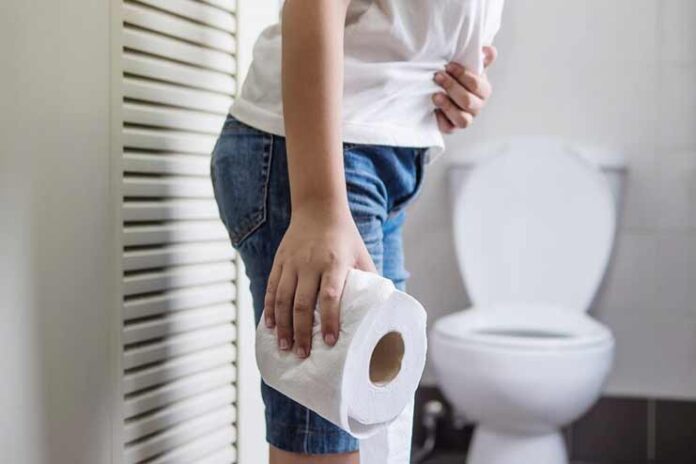Affiliate Disclaimer
Some links in this article are affiliate links. We may earn a small commission if you make a purchase through these links, at no extra cost to you. We only recommend products we find useful to our readersI think you will agree with me when I say that every single person on this planet has, at some point, suffered from the symptoms of constipation and irregular bowel movements. Well, if statistics are to be considered, it is seen that around 60% of people globally suffer from chronic constipation symptoms and the painful side effects that accompany it.
So, with more than half the world’s population suffering from constipation, it is important to find remedies that actually work.
In this article, we will review the most effective list of remedies for constipation that will help alleviate the problem and provide you with the relief you have been looking for.
What is Constipation?
When you have trouble having bowel movements or don’t have them frequently enough, you get constipated. This can vary from person to person, but for most people, it means having less than three bowel motions per week. Stools that are firm and dry due to constipation can be uncomfortable or difficult to pass.
Different Types of Constipation

Constipation is an umbrella term that explains the various sub-categories, categorized based on the severity of the condition.
There are two major categories of constipation:
- Primary constipation
- Secondary constipation
Primary Constipation
Primary constipation, otherwise known as functional constipation, can be further subdivided into different categories.
Slow Transit Constipation: This is the type of primary constipation in which the entire gut motility of an individual drastically decreases, owing to which the transit time for the food to travel down the GI tract is increased as well. While this may ensure proper digestion and absorption of food, it takes a toll on an individual’s bowel movements.
Pelvic Floor Dysfunction: This is the type of primary constipation in which the improper coordination of the muscular contractions around the pelvic floor results in irregular anal contractions and relaxations, which ends up resulting in the inadequate expulsion of the stool. A common symptom of this variant of constipation includes painful defecation and discomfort in the rectal region.
Normal Transit Constipation: This is the type of primary constipation in which an individual might have regular transit time and regular bowels but still feel like their body is constipated because of the difficult excretion of the stool. This includes signs of bloating, discomfort in the abdominal region, etc.
Secondary Constipation
Now that we have covered primary constipation, which focuses on the inability of the GI tract to function, let’s review secondary constipation.
There may be conditions of constipation owing to several metabolic shortcomings and disturbances, much like that of hypothyroidism or even neurological problems like Parkinson’s disease and spinal cord injuries. These kinds of conditions also contribute to the reasons for constipation.
Causes of Constipation

Now that we understand the different types of constipation, let’s focus on some of the common causes of constipation:
- Lack of water in the body
- Minimal intake of dietary fiber
- Not being active physically
- Stress and anxiety
- Excessive consumption of laxatives
- Eating disorders
- Irritable bowel syndrome (IBS)
- Pregnancy, especially the early stages
- Hypothyroidism
- Colon cancer
Symptoms of Constipation
Several symptoms often characterize constipation. It is essential to understand the symptoms to find an appropriate remedy to treat your specific symptoms. Note that the temporary hardening of stool and improper defecation for a day or two do not necessarily mean you have constipation.
The top symptoms of constipation are:
- Irritable bowel syndrome
- Defecating thrice or less in a week
- Lumpy, hard, and dry stools
- The feeling of blockage in the rectum
- Residual in the rectum
- Physical aid in the emptying of the stomach, like that of using hands and putting pressure on the abdomen
Side Effects
Constipation might not seem like an alarming problem but sustained constipation without treatment results in side effects that are not just short-term but that could affect one’s health for the long haul.
Some of the common side effects of constipation include:
- Hemorrhoids
- The feeling of fullness all the time
- Abdominal uneasiness
- Bad breath
- Headaches
- Anal fissures
- Fecal incontinence
- Fatigue
The occurrence of nausea is often connected with constipation. It is not necessarily constipation that causes the nausea, but some of the other primary causes behind it.
How to Treat Constipation?
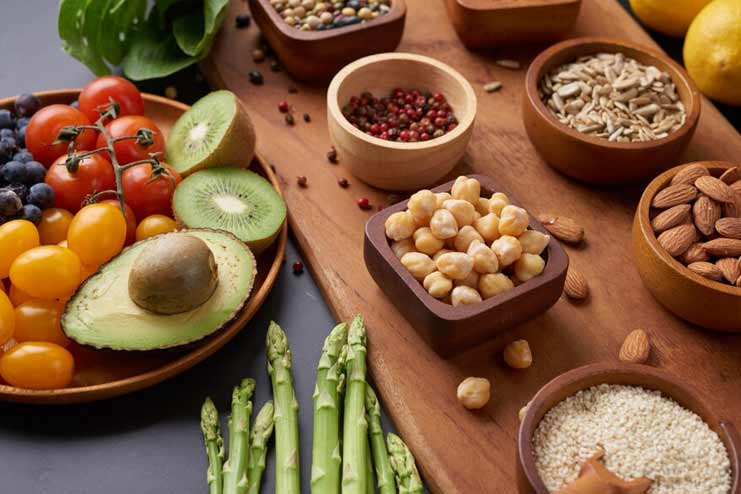
Constipation can be a taxing condition, and some common and effective cures for constipation include:
- A healthy diet that includes more dietary fibers
- Exercise helps improve metabolism
- Cutting down on alcohol
- Relying on laxatives, but only if the situation gets out of hand
Home Remedies
Constipation can easily be treated with home remedies if administered carefully and at regular intervals. Scroll down to learn more about the various constipation home remedies that work wonders.
- Apple Cider Vinegar
- Baking Soda
- Blackstrap Molasses
- Epsom Salt
- Lactulose
- Ginger
- Garlic
- Lemon Water
- Gripe Water
- Chocolate
- Coffee
- Vitamin C
- Dates
- Jeera Water
- Cascara Sagrada
- Pineapple
- Mango
- Bananas
- Raisins
- Oranges
- Berries
1. Apple Cider Vinegar
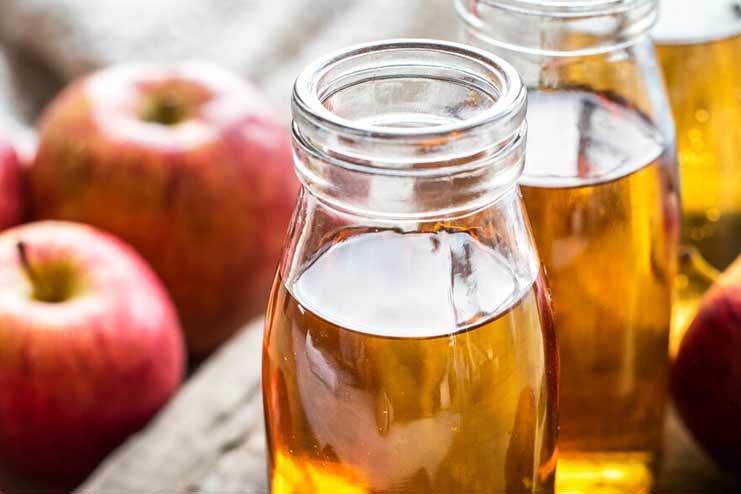
Apple cider vinegar is rich in natural laxative properties, which promote regular bowel movement. It is also rich in pectin, which helps digest the ingested food.
Things You Will Need
- 1 tablespoon of apple cider vinegar
- 1 glass of water
Process Involved
- Mix one tablespoon of apple cider vinegar to one glass of water
- Drink this first thing in the morning
Do this every morning to improve metabolism and bowel functioning
2. Baking Soda
Baking soda helps alkalize the excess production of stomach acid and helps get rid of the symptoms of indigestion, which is often the reason for situational constipation.
Things You Will Need
- 1/4 tablespoon baking soda
- Glass of water
Process Involved
- Mix the baking soda with the glass of water
- Drink this to alleviate constipation
Caution: As baking soda produces carbon dioxide in reaction with the stomach acids, it is not a favored long-term cure for constipation.
3. Blackstrap Molasses
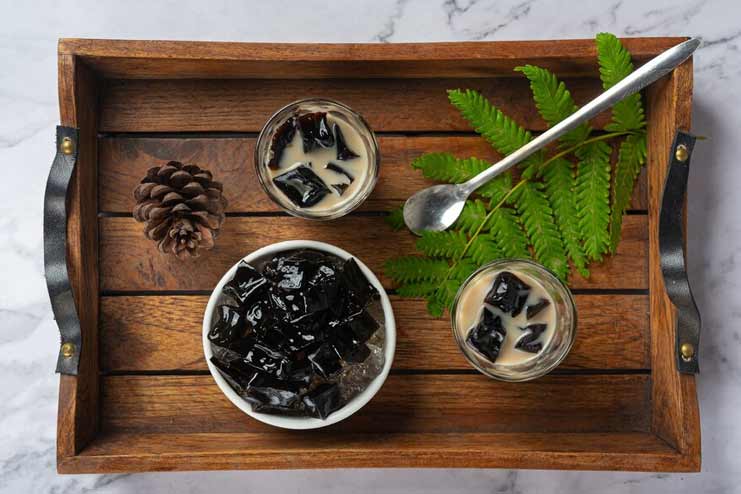
Triple processing concentrates the vital minerals and vitamins in blackstrap molasses. It is rich in magnesium, which can help ease the symptoms of constipation.
Things You Will Need
- One tablespoon of blackstrap molasses
Process Involved
- Scoop out one tablespoon of blackstrap molasses
- Eat this before bed at night
4. Epsom Salt Bath
Epsom salt is rich in magnesium and has amazing benefits for treating constipation. The magnesium soaks in the skin from the bath and helps relax the muscles around the GI tract and abdomen to relieve constipation.
Things You Will Need
- 2 cups of Epsom salt
- A bath full of water
Process Involved
- Fill your bathtub with water
- Add the two cups of Epsom salt and soak your body in it for 15-20 minutes
You can do this every other day for excellent results.
5. Lactulose
Lactulose is an artificially made synthetic sugar that travels down to the large intestine and breaks down there when consumed. It draws water to the large intestine, softening the stool and ensuring less painful defecation.
Things You Will Need
- Prescribed dosage of lactulose
Process Involved
- The dosage of lactulose for kids should be consulted with the doctor
- The dosage for adults varies from 1-2 tablespoons. Please refer to the instructions on the package
Once per day is more than enough to cure constipation symptoms.
6. Ginger
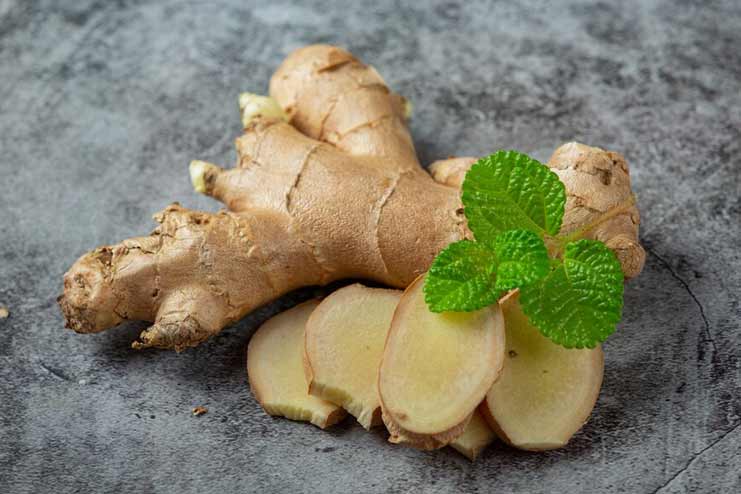
Ginger is believed to have fantastic warming properties on the body. It helps improve digestion and acts as a mild laxative that helps regularize bowel movement. Check out more Ginger health benefits.
Things You Will Need
- Ginger teabag
- Hot water
Process Involved
- Heat water and bring it to a boil
- Steep the ginger tea bag in it for 10 minutes
- Consume this warm drink to cure constipation
7. Garlic
Garlic helps with food digestion and stimulates the movement of the intestinal walls, which aids in proper bowel movement.
Things You Will Need
- Cloves of raw garlic
Process Involved
- Peel some raw garlic cloves
- Chew on them without adding anything else to it
Eating raw garlic every morning can help treat constipation.
[Also Read: Amazing Health Benefits of Garlic]
8. Lemon Water

Water helps lubricate the forming stool and the acidity of the lemon juice aids in the proper breakdown of the food and aids in digestion. Together, they help cure constipation and help make bowel movements regular. Drink this concoction every morning.
Things You Will Need
- Juice of half a lemon
- A glass of warm water
- Honey (if required)
Process Involved
- Add the freshly squeezed juice of a lemon to the glass of warm water
- Mix in a tablespoon of honey if need be
- Drink this every day in the morning on an empty stomach
Read More Benefits of Drinking Lemon Water in the Morning
9. Gripe Water
Gripe water has mild laxative and soothing properties. It helps ensure a softer stool and better digestion, which helps alleviate constipation symptoms. Drink it whenever necessary.
Things You Will Need
- Over-the-counter gripe water
Process Involved
- Administering prescribed dosage of gripe water
10. Dark Chocolate

Dark chocolate is loaded with magnesium, which helps relax the muscles of the GI tract, thus aiding in proper digestion and easy defecation.
Things You Will Need
- A few pieces of dark chocolate
Process involved
- Eat a few pieces of dark chocolate daily
Eating two to three pieces of dark chocolate daily can help treat constipation.
11. Coffee
Coffee is rich in natural laxative properties, which aid in curing constipation. It helps stimulate bowel movement as well. But, it also has dehydrating properties, so it is best to stay wary of the amount you consume and not overdo it.
Things You Will Need
- 2-3 cups of brewed coffee
Process Involved
- Drink 2-3 cups of coffee throughout the day
Make sure to keep the count of cups in check. It is best not to consume more than 2-3 cups.
12. Vitamin C
Vitamin C is rich in laxative properties and is a fantastic remedy for constipation. Not just that, fruits rich in Vitamin C are also rich in dietary fibers, which provides natural constipation relief.
Things You Will Need
- Food items rich in Vitamin C, such as citrus
Process Involved
- Increase the intake of citrus fruits in your diet
Eat one citrus fruit every day for promising results.
13. Dates

Dates are rich in fiber and nutrition, which aids in relieving the signs of constipation. It aids in the process of digestion as well, which further ensures regular bowel movements.
Things You Will Need
- Dates (as needed)
Process involved
- Munch on dates as a snack, two or three, occasionally.
14. Cumin Water
Water acts as a natural softener and laxative for relieving the signs and symptoms of constipation. The cumin seeds help with digestion, which, in turn, adds to the treatment of constipation.
Things You Will Need
- 1 tablespoon of cumin seeds
- A saucepan filled with water
Process involved
- Boil one tablespoon of cumin in a saucepan of water
- Let the concoction sit for a while
- Strain the liquid and drink it
Drink this liquid every day on an empty stomach in the morning.
15. Cascara Sagrada
Cascara Sagrada is a natural laxative that ensures regular bowel movements. It is also rich in fiber content, which helps treat constipation symptoms.
Things you will need
- Cascara Sagrada
Process involved
- As per the prescribed dosage
How often?
It is always best to consider the safety guidelines before jumping straight into using this remedy for constipation because much like several other remedies, even this one comes with its fair share of side effects.
Fruits for Constipation
Fruits are one of the best sources of healthy dietary fibers, making them one of the best remedies for constipation. Consuming fruits ensures proper digestion, prevents you from over-eating, and helps combat your hunger.
Some of the fruits that work as a fantastic cure for constipation include:
16. Pineapple
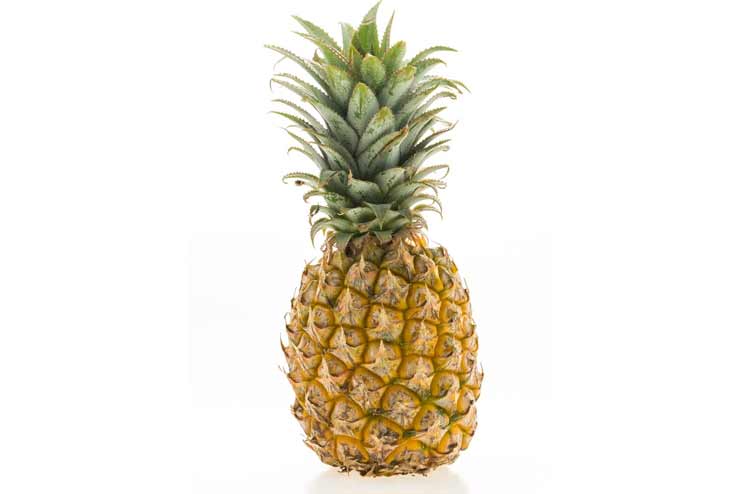
Pineapple has an amazing effect on constipation relief, primarily because it helps provide the body with both fluid and fiber at the same time, making the excretion process a lot easier and less painful.
Pineapple also contains a compound called bromelain, which is effective in regularising the bowel movements of individuals suffering from constipation.
Directions for Consumption
- Either drink a glass of pineapple juice every morning with breakfast or
- Snack on cubed pineapple pieces once or twice a day
Read More Benefits of Pineapple Juice
17. Mango
Ripened mango is rich in several polyphenols and fibers, which aid in relieving the irregularity in bowel movement. Not just that, it also helps improve digestion.
Directions for Consumption
- Eat fresh-cut mangoes as a snack every day (avoid them if you are diabetic)
- Add mangoes to smoothies and salads
18. Bananas

Unripe bananas promote constipation, but ripened bananas help keep the symptoms of constipation at bay. It helps soften the stool and reduces the pain that often accompanies constipation.
Side Note: If you are eating bananas for constipation relief, make sure to eat the fully ripened ones because unripe bananas cause constipation because of the insoluble fiber present in them.
Directions for Consumption
- Eat one or two medium-sized ripe bananas or
- You can add bananas to smoothies and drink them for constipation relief
19. Raisins
Raisins are an amazing source of dietary fibers that help regulate an individual’s bowel movement. They also aid in proper digestion.
Directions for Consumption
- Snack on a handful of raisins during breakfast
20. Orange Juice
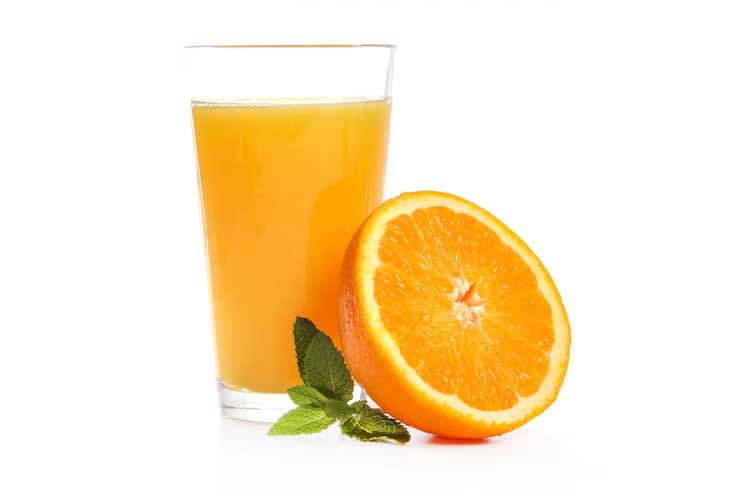
Oranges are rich in Vitamin C, which has mild laxative properties. Not only that, but the mild acidity from the oranges also helps break down the food to improve digestion.
Direction for Consumption
- Eat one or two whole oranges, either with your breakfast or as a snack throughout the day.
- Drink freshly squeezed orange juice with your breakfast.
21. Berries
Like most fruits, berries are loaded with good dietary fibers which improve digestion. Not just that, it even helps in softening the stool for easier and less painful bowel movements.
Directions for Consumption
- Berries can be eaten as a snack at any time throughout the day or
- Incorporate berries in your smoothies and eat them as a part of your salad
What Foods to Avoid for Constipation?
Diet plays a crucial role in the recurrence and inception of constipation. If you have an irregular diet with constipation-inducing foods, there are chances that your constipation treatments are going to fail.
Several foods can cause constipation, so it is best to avoid them to maintain a healthier gut. Some common foods to avoid for constipation include:
- Unripe bananas
- Alcohol
- Gluten-rich food items
- Processed grains
- Dairy and dairy products
- Red meat
- Fast food or greasy food
Many wonder whether eggs cause constipation. And to answer the question, yes, they do. Since they are high in fat and protein and low in fiber, hard-boiled eggs can contribute to constipation symptoms.
How to Prevent Constipation?

Constipation is a condition often caused primarily due to poor dietary habits and lifestyle choices. Maintaining a healthy lifestyle is essential for preventing and managing constipation effectively.
For you to have a comprehensive idea about the ways to acquire natural constipation relief, we have mentioned the best ways to control constipation and that too, in a much healthier way.
- Drink more water: Include more water in your diet. This helps keep the body hydrated and ensures that your stool isn’t too hard and can easily be excreted.
- Eat more fiber: Opt for soluble fibers because they are digested quickly.
- Exercise daily: Workouts improve gut function.
- Low FODMAP diet: For chronic constipation, follow a diet rich in fiber to promote regular bowel movements and ease constipation. Include foods like fruits, vegetables, whole grains, legumes, and nuts. Avoid foods that can worsen constipation, such as processed foods, red meat, and excessive dairy.
- Consume more probiotics: Probiotic drinks are a fantastic way to include good bacteria in your gut. This helps with proper digestion, which, in turn, aids in treating constipation.
- Avoid dairy: eliminating dairy from your diet is possibly one of the best options if you are consistently suffering from constipation.
When to See a Doctor?
Constipation does not require or demand a doctor’s attention immediately. However, if you experience the side effects of constipation, as mentioned in a prior section, it is best to go see a doctor for a constipation cure.
- There are instances when constipation could be an indicator of diseases like colon cancer. So, if you have a lingering question of whether or not constipation can be an after-effect or side effect of any form of cancer, the answer is a definite yes. Colon cancer is one of the most common reasons for constipation.
- Not only that, pregnant women may experience signs of constipation during the initial days of pregnancy. If you feel signs of constipation creeping in out of nowhere and hitting you suddenly, take a pregnancy test and see a gynecologist, if necessary.
Now, regarding which doctor to see, seek a gastroenterologist to treat constipation. Whatever the cause, a GI specialist can detect any further problems.
Constipation is often a painful experience for people suffering from it. To relieve constipation, it is often advised to opt for common natural remedies or see a doctor. We hope that these remedies mentioned in this article will come in handy for you.
Conclusion
Managing constipation effectively can be as simple as incorporating some home remedies and making lifestyle adjustments. From dietary changes like increasing fiber intake to natural remedies like apple cider vinegar, lemon water, and fiber-rich fruits, these methods offer safe, accessible, and proven ways to relieve constipation. Remember that consistency is key; adopting these practices regularly will provide long-term benefits in digestive health and overall well-being.
However, if constipation persists despite trying these remedies, it may be a sign of an underlying health condition, and consulting a healthcare professional is always recommended. Embracing these simple and natural approaches can make a significant difference in maintaining a regular, comfortable digestive routine.
-
June 2018Written by Somapika D
-
Nov 2024Edited by Lakshmi Gayatri
In this Article















